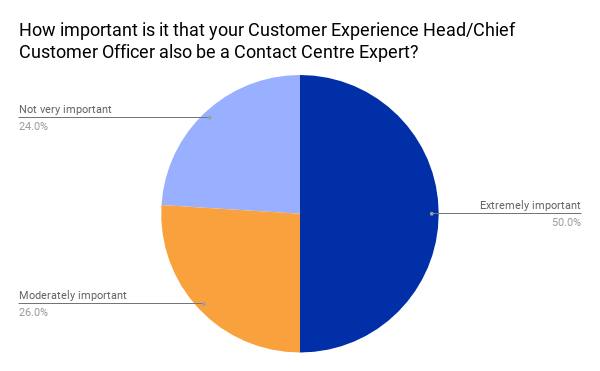How important is it that your Customer Experience Head be a Contact Centre Expert too? In this article, Daniel Ord, CCXP considers the answer to this question.
In early June, I tried out the new LinkedIn polling feature for the first time. The poll I put up was: “How important is it that your Customer Experience Head/Chief Customer Officer also be a Contact Centre Expert?”
There were 3 voting options (only one vote is allowed by the way):
- Extremely important
- Moderately important
- Not very important
Before you read further, take a moment and mentally vote. If you had seen my poll on LinkedIn – what have you voted?
Now, take another moment. Assume someone in the industry were to ask you ‘why did you select that option?’ – what would you say? Take a moment to think about why you voted the way you did.
I chose the phrase ‘contact centre’ expert for the poll question deliberately. Not just someone who values contact centres or thinks that they are important – for example, someone in marketing. An ‘expert’ would be someone you would consider hiring to run your centre at a high level or an external consultant that you would bring in to help bring your centre to a high(er) level.
As any contact centre expert will tell you there is some extremely specific know-how required to run a great centre. Operations, people management, customer experience, leadership, and quality. That is what I mean by ‘expert’.
Initial Results
I allowed 7 days for the votes to come in. These were the final results after the poll closed:

Interestingly there were some qualitative comments on the post as well – which I’ll get to in a bit.
The Role of Qualitative Research
Before I dive into the results and our findings and thoughts, a note on Qualitative Research. Clearly a LinkedIn poll isn’t statistically viable. Results can’t be confidently extrapolated across the industry.
But that’s not the point. It was never the point.
Polls like these provide interesting fodder for raising questions and pointing to where additional research might bring more insight. That’s the power of ‘qualitative’ research. And that’s the spirit of this article.

So who were the people that voted ‘extremely important’?
After the poll closed we wanted to update everyone who voted. So I put out this short note – which we will tackle in pieces for this article:
“Thanks to everyone that voted!
The results were more skewed than I expected with 50% voting ‘extremely important’ that a CX Head be an expert in Contact Centres.
So we explored further by digging into each voting option to see ‘who’ voted for this option. Here’s what we found:
Of the 50% who voted ‘extremely important’, 72% of those voters work in a Contact Centre or Customer Service role.“
I was curious as to why half of all the voters in the poll chose this option, so I decided to dig into the composition of ‘who’ these voters were.
To do that I worked with a colleague to look at the LinkedIn profile of each person that voted to determine ‘what they did’ at work.
Sometimes it was obvious – for example, Head of Contact Centre for X organisation or Voice of Customer Manager for Y organisation. At other times we needed to dig deeper into the current job description.
The use of hyphenated job titles such as “CX |Data Analytics | Customer Service | Employee Experience” seems to be popular in LinkedIn profiles.
We just had to work harder to figure what folks with these kinds of job titles in their LinkedIn profile actually ‘did’.
Equipped with our classification system we found that 72% voted for ‘extremely important’ worked in the Contact Centre or Customer Service function at their organisation. A significant majority.

What about the people who voted ‘moderately important’?
Of the 26% who voted ‘moderately important’, 47% of those voters work in a Contact Centre or customer service role. So if you combine the voters for ‘extremely important and the voters for moderately important you get:
76% of all voters felt that it was extremely or moderately important that the CX Head be a contact centre expert. Click To Tweet
Finally, the people who voted ‘not very important’
Of the 24% who voted ‘not very important’, only 30% of those work in a contact centre or customer service role. The remaining 70% of voters who chose ‘not very important’ work in a CX function or as a CX Consultant.
Summing up the results
So while we know that correlation does not equal causality here’s what we can say about this poll,
“There is a positive correlation between how important it is that a CX Head be a contact centre expert and the percentage of voters who work in the contact centre and customer service industry.” Click To Tweet
Or put another way – the importance that the CX Head also be a contact centre expert fell as the percentage of voters who work in contact centres or customer service fell.
We did receive some interesting qualitative comments from voters including these:
“I can’t imagine not being a “well-seasoned” contact centre manager, otherwise you will end up “well-seasoned” on a spit over an open fire on your way out as a failed CX Officer.”
“I voted extremely important not because I think they need to be hands-on with the contact centre but they have to know how to influence the contact centre managers in the grand scheme of strategic planning. If you don’t fundamentally understand how a contact centre manager goes about their day, you will undoubtedly be destined to fail.”
“Maybe the word ‘expert’ is not the best, but CX Leaders absolutely need to know how best-in-class contact centres operate.”
Though the correlation wasn’t as strong, as the percentage of voters in CX-related job roles increased – the level of importance that a CX Head be a contact centre expert decreased.
Put simply, most of the voters in CX-related job roles didn’t think it was that important that the CX Head also be a contact centre expert. Click To Tweet
Here are some verbatim comments received from the CX side of the house:
“This is the conundrum of CX professionals far and wide 😂 the dreaded contact centre box. CX is further reaching than just contact centre management.”
“Your chief customer officer has to be more aligned with the CEO than the contact centre. Perhaps at a lower level, it becomes more important – but a CCO has to be an expert in overall operations, marketing, strategy, product development, legal, HR, etc – before specific contact centre knowledge comes into play.”
“My view has always been that the person at the top of the pyramid can’t be an expert in everything. But they need to have trusted persons who do master the various aspects and who can advise. That doesn’t mean that the boss shouldn’t be a specialist in one or more aspects of the job.”

Why did so many contact centre and customer service folks vote ‘extremely important’ to this question?
As we shared earlier, qualitative research is great at bringing up ideas for what to study next. I think this would be an interesting research to conduct in the future.
But even though we don’t have that research in hand – we do have some thoughts on these results.
1. Pride in the contact centre and customer service industry
Whether you’re sitting in the annual Contact Centre Awards gala in Singapore, visiting the bustling Call Centre Show in Berlin or just meeting agents and team leaders anywhere in the world – everyone’s buttons are bursting.
This is an industry that’s full of (well-deserved) pride. Dealing with the mental and emotional labour of serving customers – and serving the folks who serve customers day in and day out – is rewarding.
But also pressurising. Imagine a lump of coal being relentlessly squeezed on all sides. On one side, you have customers. Not in aggregate or grouped into slices in a pie chart – as they tend to appear in financial analyses or reports.
One by one. Each with their own unique needs, expectations and wants. One after the next. It’s a spout you can’t turn off.
On the other side, you have an organisation. There are KPIs to meet, metrics to conform to, quality standards to adhere to.
Senior management asks questions like – why are we taking so long to serve customers? Why aren’t the CSAT scores higher? Why did this guy complain about X, Y or Z? Why is attrition so high? Isn’t running a centre just a matter of common sense?
We can’t forget the pressure contact centre and customer service people put on themselves. Because when you serve customers you want to do a good job. You want it to go well. You want positive outcomes. When it’s not – or not right now – it can feel very lonely.
2. A lack of clarity on customer experience and the role of the CX Head
Customer experience is not customer service on steroids. It’s a glib statement. But it’s true. I find that contact centre and customer service folks tend to rebrand much of what they do into ‘Customer Experience’.
We are not contact centres – we are customer experience centres. our agents are not customer service professionals – they are guest experience officers.
It’s customer service on steroids. I get the power of branding and job titles. But this blurring of the lines between CX & the contact centre confuses people. Not least, the ones who work in your organisation.
In workshops, when I ask a group of contact centre team leaders for their definition of customer experience they rarely answer a) the same way b) correctly.
Even contact centre directors and managers often struggle to articulate what CX ‘is’ and what it isn’t in the context of what they do.
It’s kind of hard to bring CX to life if people don’t even know what it is.
Definitions
So let’s look at definitions. Not ‘my’ definition or ‘my’ take. But industry definitions that have been around a while. After all – we’re talking about mature and maturing industries here. There are existing and powerful definitions.
First off – what is the definition of a Contact Centre? I am an ICMI Certified Associate and this ICMI definition is the one I have used for years in my training work. It’s as relevant today as it was almost 20 years ago.
A coordinated system of people, processes, technologies and strategies that provides access to organisational resources through appropriate channels of communication to enable interactions that create value for the customer. Click To Tweet
In this new era, it’s valuable to also add the employee into the mix here. But that was always implied and part of this definition anyway. It just wasn’t specifically stated. So to boil it down – the contact centre is where we align resources to meet customer demands.
Now let’s look at the definition of CX. I am a CXPA Recognised Training Provider and though I present a few CX definitions in classes for discussion – I think Bruce Temkin from Qualtrics has the best one overall:
Customer experience is the perception that customers have of all their interactions with an organisation. Click To Tweet
Right away you can see that the playing fields are different. CX folks have a mandate across the entire organisation. Contact centres have a mandate for aligning resources to customers who choose (happily or not) to use those resources. It’s a subset of customer experience.

Earlier this year I wrote an article on ‘What To Look For When You Hire A Contact Centre Manager’. For purposes of this article, an ‘expert’.
I recap those competencies here:
- Operations & Technology
- People Management (today’s Employee Experience)
- Leadership & Business Management
- Service & Quality Management
But with the caveat that they already have an extremely robust job role – and can’t be expected to take on the CX job role too. Of course, I support that a contact centre manager formally learns customer experience too.
When contact centre management has a solid understanding of CX, how their centre contributes to CX, and how they can work better with the CX Head and Team, that means only better outcomes for everyone.
Before leaving the contact centre competencies it’s worth mentioning here – that even the contact centre head is going to rely on others to have their own areas of expertise. For example, training, quality assurance, workforce management, tech or human resources.
Just because the contact centre head is ‘in charge’ of these special functions, it doesn’t mean that they must be an ‘expert’ in them.
CX Management Competencies
So what are the competencies for CX? Since I’m a CXPA Recognised Training Provider, I draw on the CXPA standard as a guide.
So the CX Head and Team will:
- Act as a centre of excellence for a deep and fundamental understanding of CX
- Guide development and execution of the CX strategy
- Drive voice of customer strategies and methodology (which includes personas & journey mapping)
- Implement experience / human-centred design principles and methodologies
- Educate & drive metric and measurement strategies + practices
- Ensure good governance practices are in place
- Support culture-building efforts and practices
Before leaving the CX competencies, let’s repeat what we said about the contact centre head. A CX Head is not going to be an expert in every CX competency. They’re going to rely on other members of the CX Team – or outsourced partners – to bring specialised expertise to their CX objectives.
For example, designing surveys, conducting analyses on VOC data and implementing experience design practices all require specialised know-how.
Interestingly, I do not find that CX people mix up their job roles with those of the contact centre or customer service folks.
While they may not be ‘experts’ in contact centres and customer service (and many are not), they understand the value of contact centres and customer service.
Both as important touchpoints in some customer journeys – and as rich sources of voice of customer and voice of employee data and insight.

What would I have voted?
Earlier this year, I wrote an article on what CX folks can learn from contact centre folks.
So many lessons have been learned in the centre and customer service function that can be picked up and brought to new heights in customer experience.
I have a lot of pride in the 30 years I spent in contact centres and customer service. Along with 20 years conducting VOC research and teaching everything contact centre, customer service and customer experience.
One voter wrote regarding the poll:
“Asking followers of a contact-centre authority, in effect whether contact centres have executive-level importance, is a recipe for confirmation bias! It’s like asking military officers, say, how important military experience is for the PM or asking car salespeople whether people should buy a new car every three years.”
I think I am the contact centre authority referenced in the post. The one that cooked up the recipe for (presumably my) confirmation bias.
Actually, I would have voted ‘not very important’. I don’t think it’s very important that the CX Head also be a contact centre expert.
- Value the contact centre? Yes.
- Evaluate and improve journeys that involve the contact centre? You bet.
- Engage in voice of employee and voice of customer research interventions in the centre? Of course.
I think the real magic happens when contact centre folks ‘understand’ CX and CX folks understand the contact centre and they work together to the customer’s mutual benefit as well as that of their employees and their organisation.
Learn more about how contact centre technology can create a better experience for customers and agentsLearn more
Originally published Jul 29, 2020, updated Jan 16, 2023
